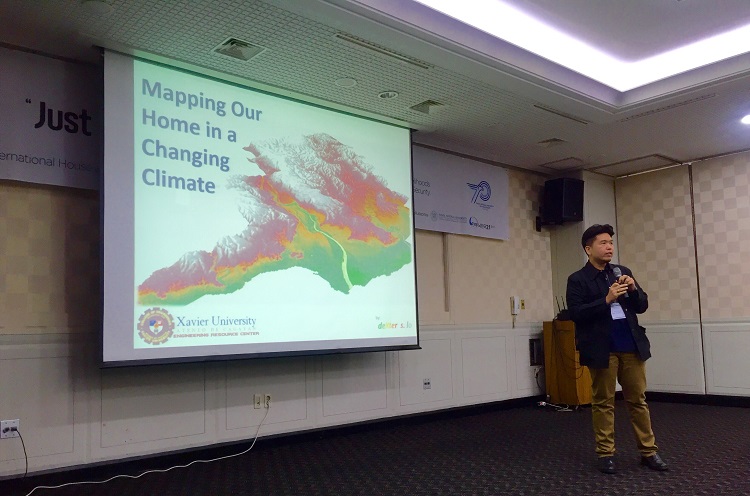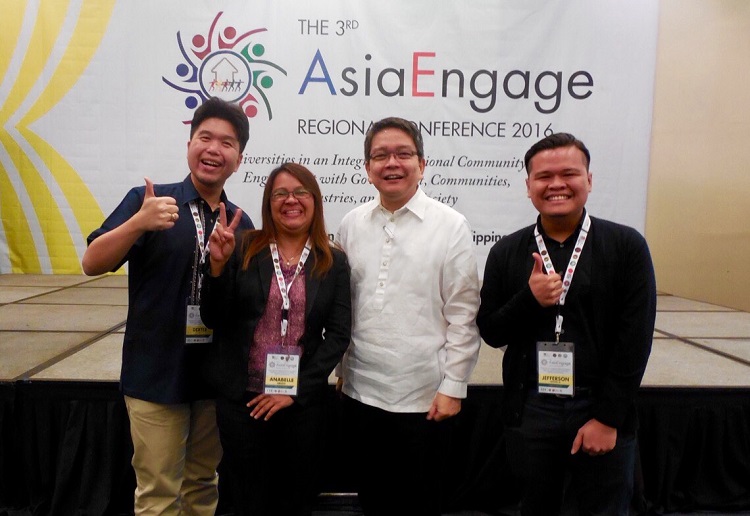
AWARD-WINNING PROFESSOR. Xavier Ateneo's Engr Dexter Lo wins the best paper award at an international conference. Supplied photo.
A member of Xavier University - Ateneo de Cagayan’s engineering faculty reaped the best paper award at the 3rd Asia Engage Regional Conference held at the SMX Convention Center in Pasay City from November 21 to 23.
Engr Dexter Lo’s study titled “Watershed and Floodplain Modeling of the Bitan-ag Drainage Basin” was awarded the best paper under the “University and Government” category, outshining other researches from various academic institutions in Asia.
Although Lo was not around during the last day of the conference, he said in an interview that the award was unexpected. “I flew back to Cagayan de Oro City early in the morning to meet my class by noon. I didn’t even know it was a contest,” he quipped.
“I just wanted to share what my students and I learned and discovered, and maybe inspire some people when they hear our stories,” Lo added.
Lo's winning paper was done in collaboration with another XU engineering faculty member Jan Taat and Xavier students Sam Stephen Mangubat, Shaira Monique Baang, Janessa Lavin, and Mark Aldrich Co.
Three other academic papers of Lo were presented at the conference:
1. Even Without the Storm: The XU DRRM Story by Engr Dexter Lo
2. Seismic Risk Evaluation of the Nine Central Schools in the Division of Cagayan de Oro City by Engr Dexter Lo (and students Francis Mae Chan, Roel Vincent Pangan, Jasmine Fabello, and Jaquelyn Mae Perez)
3. Flood Inundation Mapping along the Proposed Dike System of the Cagayan de Oro River: The Sendong Scale Flood by Engr Dexter Lo (and students Jan Taat, Carl Amiel Lapure, Augustini Ave Paduganan, Glenn Leandri Brylle Lamparas, and Khim Baculio
Other categories of the paper presentation were: “University and Communities,” “Universities and Industries,” and “Universities and Civil Society.”
The said conference was organized by the National University of Malaysia, University of the Philippines, Ateneo de Manila University, and the De La Salle University, in partnership with the Commission on Higher Education and ASEAN University Network, bearing the theme “Universities in an Integrating Regional Community: Engagement with Government, Communities, Industries and Civil Society.”

(From left to right: Engr Dexter Lo, Dr Anabel Abuzo, AdMU president Fr Jose Ramon Villarin SJ, and Engr Jefferson Vallente Jr)
Moreover, two other faculty members from the XU Civil Engineering Department presented their papers.
1. Inventory of Air Emissions for a Better Build Environment: The XUERC Service Learning Program for the City of Cagayan de Oro by Dr Anabel Abuzo and Engr Jefferson Vallente Jr
2. Shelter Mapping for Tropical Storm Sendong (Washi) in Barangays Indahag and Canitoan CDO Relocation Site by Engr Jefferson Vallente Jr
The said research projects by Lo, Abuzo, and Vallente were conducted with engineering students as their research associates and through the support of the XU Engineering Resource Center (XUERC) in partnership with various government line agencies and local government units.
XUERC is the social development arm of the XU College of Engineering that conducts researches by using state-of-the-art technologies to address real-world challenges.
Professor Lo is the founding director of XUERC.
Lo was also at the Pusan National University in South Korea to give a lecture on local impacts and initiatives in a changing climate. He was invited by the University of Erlangen-Nürnberg in Germany to give a lecture on this topic as part of the conference series, “Just Urban: Resilient Cities, Green Urban Infrastructure, Livelihoods and the Right to the City,” held on November 16 and 17 in Busan, South Korea.
Lo also presented his papers at the 3rd International River Summit (IRS), held at the Pryce Plaza Hotel in Cagayan de Oro City from November 24 to 26 and attended by more than 800 participants from all over the world. The summit is “a biennial multi-partner national initiative which serves as an avenue for leading experts, scientists, policymakers, river administrators, indigenous communities, support groups, people’s organizations, and practitioners to identify opportunities, problems, and best practices towards effectively managing rivers across four vital issues on governance, biodiversity conservation and management, climate change and disaster risk reduction management, and water quality.” ∎